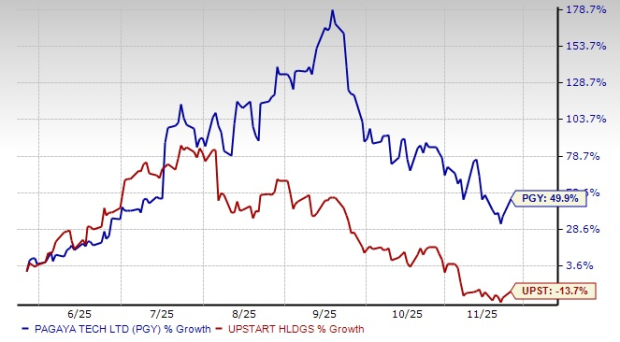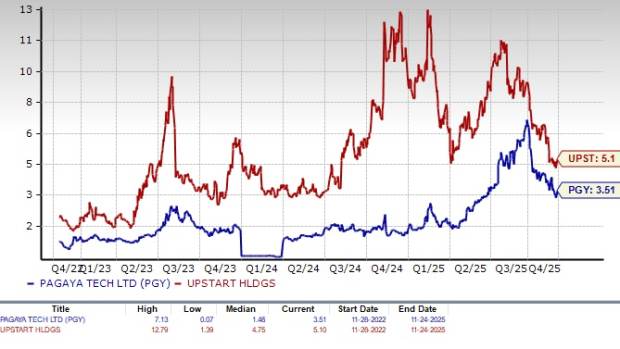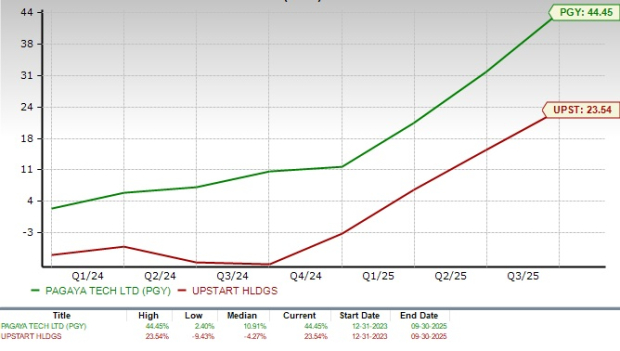|
|
|

|
|||||

|
|
Pagaya Technologies Ltd. PGY and Upstart Holdings, Inc. UPST are two key players operating in the Artificial Intelligence (AI)-driven lending ecosystem that are similar in mission but structurally distinct in how they execute and scale.
While Pagaya positions itself as a B2B enabler, partnering with banks, fintech lenders and institutional investors to help them originate and fund loans using its AI-based underwriting, UPST operates much closer to a traditional lending marketplace model.
However, unlike traditional lenders that rely on FICO scores, Upstart uses machine learning (ML) to evaluate non-traditional data points, like education and employment history, allowing it to approve loans for a broader range of borrowers and, at the same time, maintain strong credit performance.
Since Pagaya does not originate loans itself, its operating model is capital-light, less exposed to credit risk and more scalable, whereas, Upstart’s model is more exposed to funding cycles, interest rate volatility and its partners’ willingness to originate loans.
Ultimately, both companies aim to modernize consumer lending with ML, facing similar headwinds from shifting spending patterns and market uncertainties. Since their contrasting structures create different strengths, let us decipher which stock is better placed for long-term growth.
With an adaptable business model and capital-efficient structure, Pagaya initially focused on personal loans. Over time, the company expanded into auto lending and point-of-sale financing, reducing exposure to any single loan type and improving resilience across economic cycles. To diversify its funding, PGY has built a network of more than 135 institutional partners and utilizes forward flow agreements — pre-arranged deals where investors commit to buying future loans. These agreements offer funding stability, especially during market disruptions.
A key differentiator is Pagaya’s proprietary tech and product suite. Its pre-screen solution allows lenders to present pre-approved offers to existing customers without formal applications, helping partners boost credit access and deepen relationships with minimal marketing spend.
Additionally, Pagaya operates with minimal on-balance-sheet exposure. Loans are typically acquired immediately by asset-backed securities (ABS) vehicles or via forward flow agreements, thanks to capital raised in advance. This approach limits credit and market risk, preserving flexibility during turbulent environments. By relying on forward flow agreements and strategic ABS issuance, Pagaya has maintained liquidity and minimized loan write-downs.
Last month, PGY closed Revolving Pool Master (RPM) 2025-5 and PAID 2025-7, two ABS transactions backed by auto loans originated through its lending partners, which has brought the company’s total amount raised to fund personal loans to more than $4 billion so far in 2025. In the beginning of this month, Pagaya announced a forward flow agreement with Castlelake, for the purchase of up to $500 million of auto loans sourced through its platform.
Driven by strong network volume growth, improved monetization, better operating leverage and solid credit discipline, supported by an improvement in capital structure, PGY recorded three consecutive quarters of positive GAAP net income this year, representing a dramatic turnaround from the substantial losses experienced in the previous years.
Being an AI-driven fintech disruptor, UPST pioneered the application of AI to lending, enabling a system that is more efficient and accurate for both borrowers and lenders. By acting as an intermediary, the company earns revenues through referral fees from lending partners, loan servicing fees and income from loan sales and securitization.
Similar to PGY, UPST has expanded into auto lending and is exploring opportunities in small business loans and mortgages, to create diverse revenue streams, boosting its long-term potential.
Upstart has long maintained that credit underwriting should reflect real-time data and AI rather than depend on static scorecards. With more than 98 million repayment events informing its system and roughly 105,000 more repayments due each day, its models keep sharpening its ability to distinguish between safer and riskier borrowers. This expanding dataset gives the platform a structural advantage as accuracy steadily improves.
In portions of third-quarter 2025, the model picked up early signs of rising risk, prompting it to tighten approvals and raise pricing. That shift pushed conversion rates down from 23.9% in the second quarter to 20.6% in the third. While the resulting slowdown unsettled some investors, management emphasized that the model behaved as designed, responding faster than human underwriters and prioritizing credit performance ahead of near-term volume.
Moreover, in the third quarter, the company reported its best quarter of the year for new bank and credit union partners, adding seven and reaching an all-time high in available monthly funding. Meanwhile, Upstart continues to wind down the heavier balance-sheet usage that came from testing new products. Management expects several capital-partner deals to close across auto, home and small-dollar lending, which should reduce Upstart’s R&D balances and support cleaner, lighter growth into 2026.
In the last six months, shares of Pagaya have performed much better than Upstart. The stock has gained 49.9%, whereas UPST has lost 13.7%. Hence, in terms of investor sentiments, PGY has the edge.

From a valuation perspective, Pagaya is currently trading at a trailing 12-month price-to-book (P/B) of 3.51X, while UPST stock is trading at a trailing 12-month P/B of 5.10X.
So, in terms of valuation, PGY is inexpensive compared with Upstart.

Pagaya’s return on equity (ROE) of 44.45% is above Upstart’s 23.54%. This reflects that PGY is more efficient in using shareholder funds to generate profits.

The Zacks Consensus Estimate for PGY’s 2025 and 2026 revenues indicates year-over-year growth of 28.4% and 19.2%, respectively.
The consensus estimate for PGY’s earnings indicates 273.5% and 10% year-over-year growth for 2025 and 2026, respectively.

On the contrary, the Zacks Consensus Estimate for UPST’s 2025 and 2026 revenues implies year-over-year increases of 62.8% and 15.9%, respectively.
Also, the consensus estimate for Upstart’s earnings indicates massive 940% growth for 2025 and a 57.7% rise for 2026.

Pagaya is scaling rapidly with its flexible, capital-light model, AI-powered lending solutions and a strong network of funding partners. While Upstart offers explosive revenue and earnings growth prospects and technological edge, it remains tied to the unpredictability of credit cycles and capital markets.
Moreover, PGY has a more favorable valuation and a better ROE than UPST, increasing investor confidence in the stock. Thus, Pagaya’s compelling growth trajectory makes it better positioned for long-term gains.
Currently, PGY carries a Zacks Rank #2 (Buy), whereas Upstart has a Zacks Rank #3 (Hold). You can see the complete list of today’s Zacks #1 Rank (Strong Buy) stocks here.
Want the latest recommendations from Zacks Investment Research? Today, you can download 7 Best Stocks for the Next 30 Days. Click to get this free report
This article originally published on Zacks Investment Research (zacks.com).
| 5 hours | |
| 7 hours | |
| 8 hours | |
| 14 hours | |
| 18 hours | |
| Feb-16 | |
| Feb-16 | |
| Feb-13 | |
| Feb-13 | |
| Feb-13 | |
| Feb-13 | |
| Feb-12 | |
| Feb-11 | |
| Feb-11 | |
| Feb-11 |
Join thousands of traders who make more informed decisions with our premium features. Real-time quotes, advanced visualizations, backtesting, and much more.
Learn more about FINVIZ*Elite